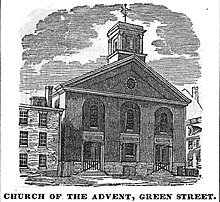Church of the Advent (Boston)
| Church of the Advent | |
|---|---|
| 42°21′28″N 71°04′17″W / 42.357757°N 71.071496°WCoordinates: 42°21′28″N 71°04′17″W / 42.357757°N 71.071496°W | |
| Location | 30 Brimmer St Boston, Massachusetts |
| Country | USA |
| Denomination | Episcopal |
| Tradition | Anglo-Catholic |
| Website | theadventboston |
| History | |
| Founded | 1844 (parish) |
| Consecrated | December 1, 1894 |
| Architecture | |
| Status | Parish church |
| Functional status | Active |
| Architect(s) | John Hubbard Sturgis |
| Style | English Gothic Revival |
| Years built | 1875-1888 (present building)[1] |
| Specifications | |
| Number of spires | 1 |
| Spire height | 172 feet (52 m) |
| Bells | 8 |
| Administration | |
| Diocese | Episcopal Diocese of Massachusetts |
| Clergy | |
| Rector | Allan Bevier Warren III |
| Laity | |
| Organist(s) | Mark Dwyer, Katelyn Emerson |
The Church of the Advent is an Episcopal Church parish in Boston, Massachusetts, United States. The church is housed in a Victorian Gothic building, faced in brick with eight large change ringing bells and a 172-foot spire.[2] It has long been a prominent center of Anglo-Catholic worship.
Location[edit]
The church building is located at 30 Brimmer Street at the corner of Mount Vernon and Brimmer Streets on the “flat” of Beacon Hill. It is next door to the historic Charles Street Meeting House.
History[edit]
The church was begun in 1844 by a group who wished to implement the ideals of the new Oxford Movement, then about a decade old in England. The founders defied the widespread custom of renting pews, whereby those who had the means leased the best seats, often from generation to generation. Servants and the poor were relegated to places in the back or in the galleries. Such pew rents provided income for churches but also effectively excluded those who could not afford them, thereby enforcing social distinctions contrary to the essential nature of Christianity. Founders wrote in the parish charter that their intention was "to secure to a portion of the City of Boston the ministrations of the Holy Catholic Church, and more especially to secure the same to the poor and needy, in a manner free from unnecessary expense and all ungracious circumstances."[citation needed]
In 1872. Father Charles Chapman Grafton became the Advent's fourth rector. It was during his tenure that construction began on the parish's permanent home, the Gothic Revival structure on Brimmer Street on the "flat" of Beacon Hill. Previously the congregation had moved from its first meeting space, an "upper room" in a building on Merrimack Street, to rented space in a building near Causeway Street, and later to a church on Green Street in Boston's since-demolished West End. From it moved to a disused Congregational church on Bowdoin Street on the other side of the Hill. (This building, is now the Church of St. John the Evangelist.[1]) Father Grafton was elected bishop of the Diocese of Fond du Lac, Wisconsin, in 1888 but returned in 1894 to preach and consecrate the completed Brimmer Street church on Advent Sunday, December 1 – fifty years to the day after the parish's first services in the North End loft.
In 1936 a parishioner and master organ-builder, G. Donald Harrison of the Aeolian-Skinner Company, designed and installed a pipe organ which remains a world-renowned masterpiece of the art.[1]
A more recent parishioner, Jonathan Daniels, died in Alabama during the Civil Rights movement. Until the early 21st century a Board of 17 Trustees governed the parish as a way to preserve the style of worship and prevent the traditionally Low Church diocesan authorities from interfering with or forcing changes through the canonically required Parish Vestry elected by members in good standing (by the final decades of 20th century the diocese could not longer be characterized as Low since the great majority of parishes were Eucharistic and Mass vestments were the norm). The existence of the Board of Trustees effectively disenfranchised the congregants. The late Bishop Shaw, bishop from 1994-2014, also a monk of the Society of St. John the Evangelist located in Cambridge (a religious order which had been actively involved in the early life of the parish) decided to assert his authority over the parish. After several years of expensive legal suits a judge of the Commonwealth ruled that the Trustees, who had voted at a meeting in the Somerset Club to pull the parish out of the diocese over the ordination of women and other issues, had violated the clause in their own charter namely to be subject to the canons and constitutions of the Episcopal Diocese of Massachusetts and the Episcopal Church. The Board of Trustees was dissolved.
References[edit]
- ^ Jump up to: a b c Parish Life — The Church Building
- Jump up ^ Christopher Klein (November 8, 2009). "Where the melting pot still simmers; Beacon Hill was settled in 1625…". The Boston Globe (Boston, MA). The New York Times Company. 2009. (accessed by HighBeam Research).
External links[edit]
'Massachusetts' 카테고리의 다른 글
| Berkshire Theatre Group (0) | 2018.08.19 |
|---|---|
| Trinity Church (Boston) (0) | 2018.05.29 |
| Plimoth Plantation (0) | 2018.05.29 |
| Mayflower Compact (0) | 2018.05.29 |
| 메이플라워 서약 (0) | 2018.05.29 |

